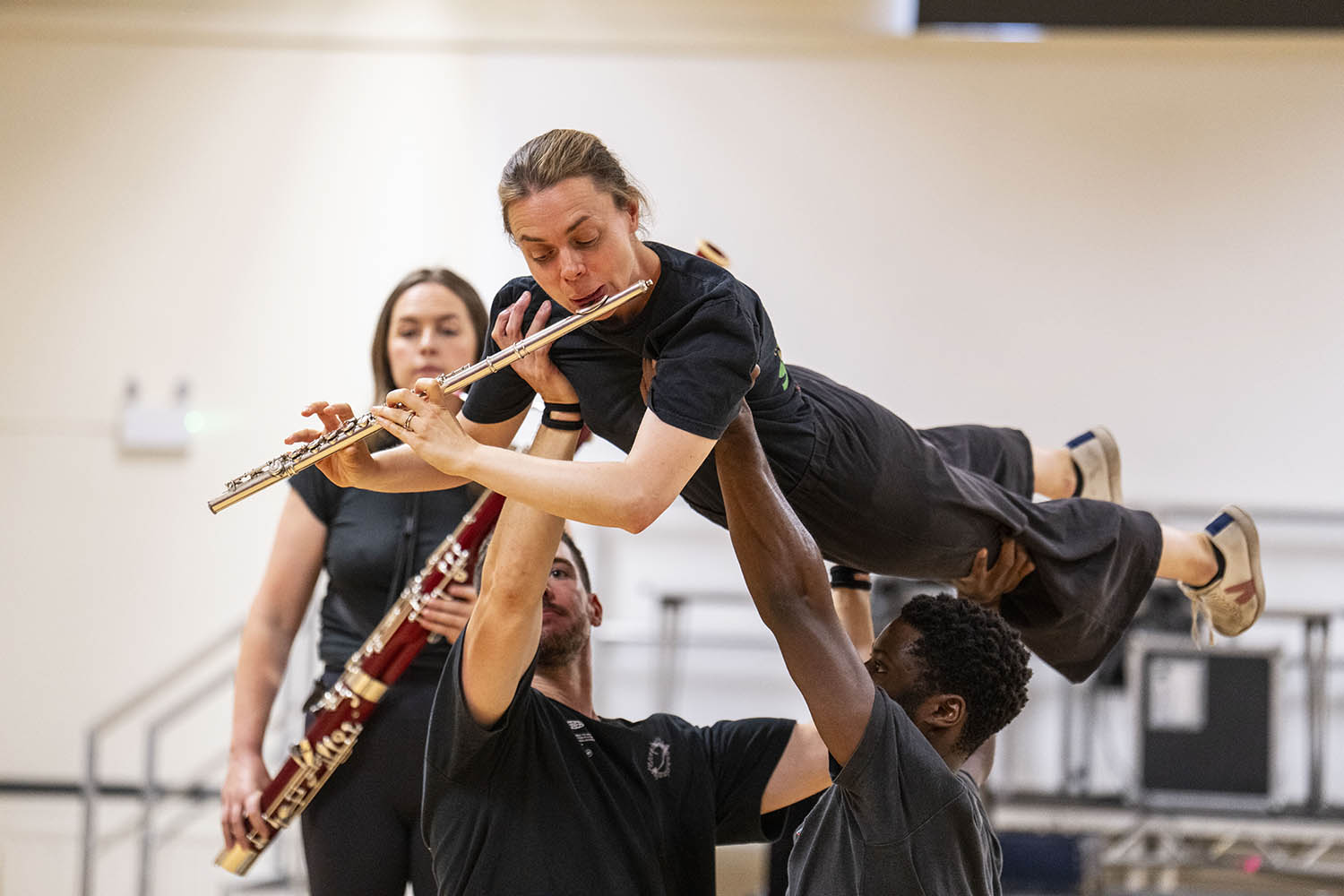At the London Welsh Centre in Bloomsbury, the strains of Shostakovich drift out towards the street. I enter a rehearsal hall, where I see a bassoonist lifted into the air by a pair of dancers as she plays the great Russian composer’s work. A few moments later, a flautist appears to levitate as she plays, her body horizontal, her notes as untroubled as if she were sitting in an orchestra pit.
This is a rehearsal of the Aurora Orchestra – and nothing is as you would expect. Not only will the musicians fly and float, but they will play Shostakovich’s great Fifth Symphony entirely from memory. For the past 20 years, under the direction of their principal conductor, Nicholas Collon, Aurora has been driven by a mission to ensure that orchestral music is for everyone; for the past decade, their symphonies-by-heart have been an integral – and astonishing – part of that process.
“Rehearsal” doesn’t quite cover what I observe. In collaboration with the theatre company Frantic Assembly, the group are devising the spectacle that will introduce the orchestra’s performance: with actors, dancers and musicians, they will set the composer’s work in historical and musical context. It is not a simple task, as conductor – and narrator – Collon acknowledges.
“The audience ranges from critics, from a hardcore audience who own every conceivable recording of the piece, through to people who’ve never stepped inside the concert hall,” he says. “You have to surf a line where you’re interesting to everybody, and I feel like you can do that through being very passionate about the music.”
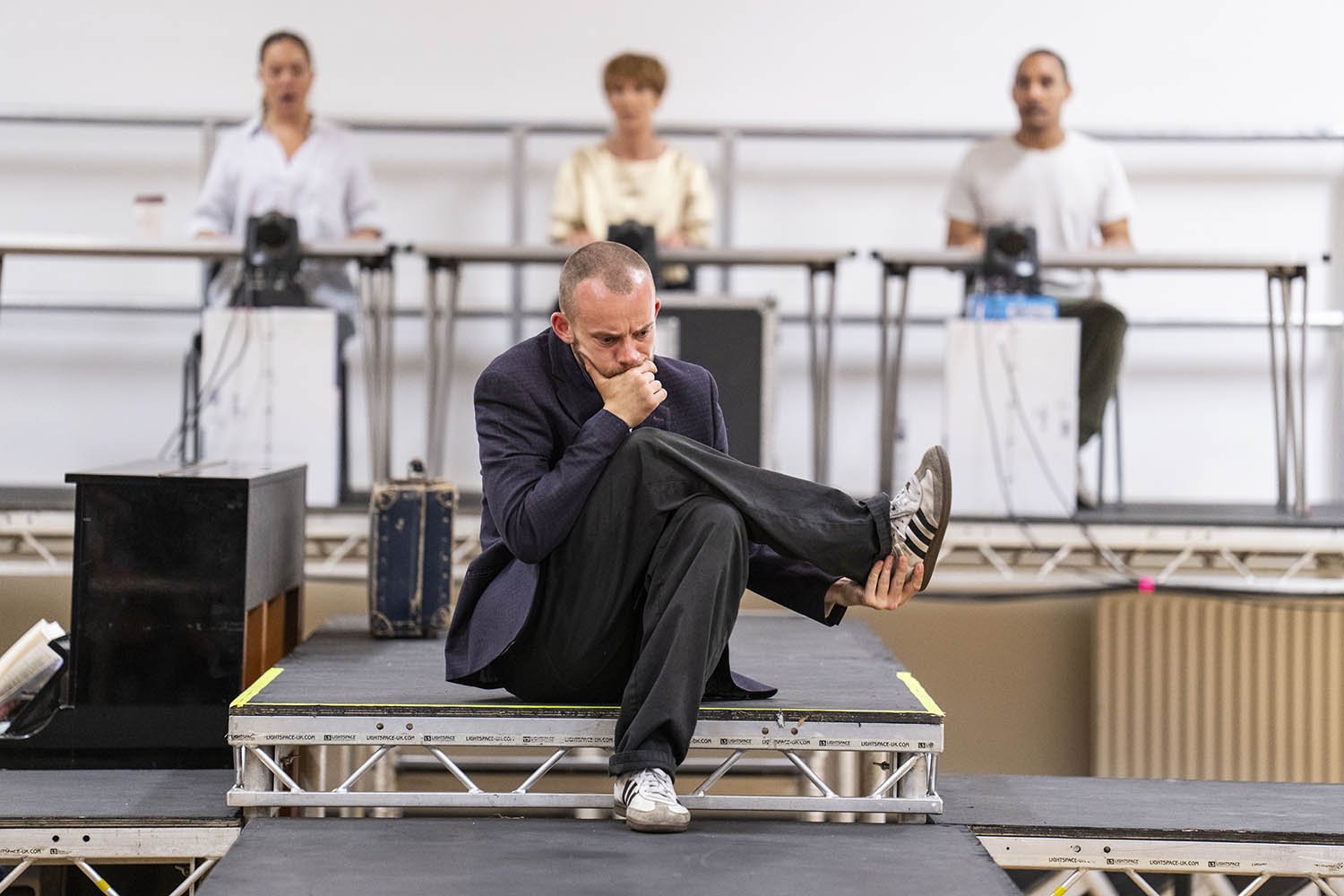
Dancer Max Revell as a silent Shostakovich
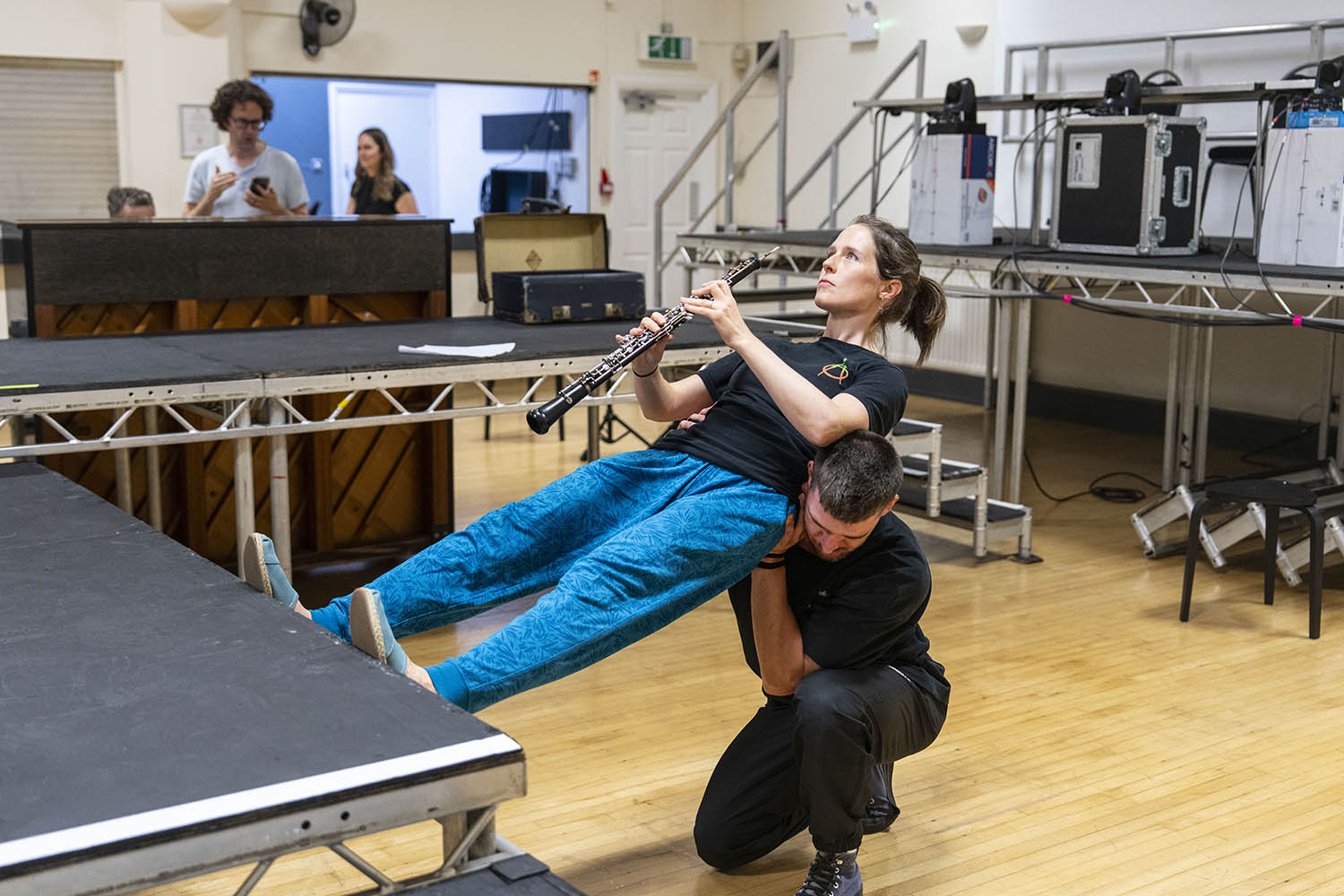
Oboist Katie Bennington is lifted on to a stage
I discovered that passion first-hand when – along with my son, Theo, who was studying music at Leeds University at the time – I went, by chance, to a late Prom in 2019, knowing only that the orchestra (one we’d never heard of) was playing Berlioz’s Symphonie fantastique. Theo had just been studying the piece. When we took our seats, we saw a stage wholly empty of music stands. What was going on?
In August 2014, Aurora became the first professional orchestra in the modern era to perform a symphony from memory – Mozart’s 40th, at the BBC Proms. The company have since memorised Mozart’s 41st, Beethoven’s Third, Fifth, Sixth, Seventh and Ninth symphonies, Brahms’s First Symphony, Shostakovich’s Ninth Symphony, Symphonie fantastique, and Stravinsky’s Firebird and The Rite of Spring.
As with many audacious artistic choices, Aurora’s memorisation was a result of necessity. Jane Mitchell is Aurora’s principal flautist – that was her seeming to soar through the air – and the visionary behind all their stagings. She researches each work, considers how to tell the story of the composition, and writes the text they will work with.
Memorising a piece makes for a truly in-depth connection with music that otherwise is so fleeting
Memorising a piece makes for a truly in-depth connection with music that otherwise is so fleeting
She recalls that, in 2014, the orchestra had the opportunity to play at the Proms, but were told that the stage had to be kept clear for the performance that was to follow. That meant no music stands. “When Aurora gets an opportunity, we really maximise it. So when they asked for an opener, I thought: ‘How about a symphony?’ And when they needed an empty stage: ‘OK, how about from memory?’” And then,” she says, “we found out what the potential really was.”
That potential is an astonishing engagement between the musicians, and therefore between the orchestra and the audience. As Collon notes, it’s a huge commitment to ask musicians to do this work; it’s why, he says, they choose “fantastic pieces”. The discipline is totally different to what is usually required of a performer: normally, “they play 10,000 notes, and then the next week, another 10,000 notes. But for this, they have to spend much more time with the music, starting to work with it and memorise it weeks away from the performance. And that makes for a truly in-depth connection with music that otherwise is so fleeting. And they do it amazingly.”
It is a striking moment in history to listen to Shostakovich’s Fifth. It was composed in 1937, after a shattering attack on the composer’s work by Joseph Stalin, whose purges terrified the whole of the Soviet Union.
In 1936 an editorial headlined “Muddle instead of music” had appeared in Pravda, attacking Shostakovich’s opera Lady Macbeth of the Mtsensk District, which had been warmly received by audiences at home and abroad. But Stalin disapproved of its avant garde style, saying it corrupted the Soviet spirit. Shostakovich had been working on his Fourth Symphony but withdrew it; shortly before the premiere of the Fifth, he published a preface, A Soviet Artist’s Reply to Just Criticism, in which he stated that preceding the composition, he had gone through “a protracted period of internal preparation”. The symphony is famously enigmatic: the composer left the music to speak for itself.
Jeremy Eichler is a historian, music critic and the author of Time’s Echo: Music, Memory and the Second World War. He says that in his Fifth, Shostakovich “finds a way of both pleasing the party but also somehow speaking past them, speaking directly to his fellow Soviet citizens, who saw in this music a crystallisation of their own hopes and dreams, and suffering. As we listen to this music today, we have the opportunity to listen profoundly to culture’s memory.” The elusiveness of this wordless form is inherent. As Arnold Schoenberg said: “Music is the only medium in which you can confess your heart while keeping your secrets.”
Mitchell is powerfully struck by playing this music now, in an era where authoritarianism and repression are returning to so much of the globe. “We’re always trying to make things relevant,” she says. “And it’s not that difficult with this piece. It’s sort of scarily, scarily easy for this to have resonance very close to us all.”
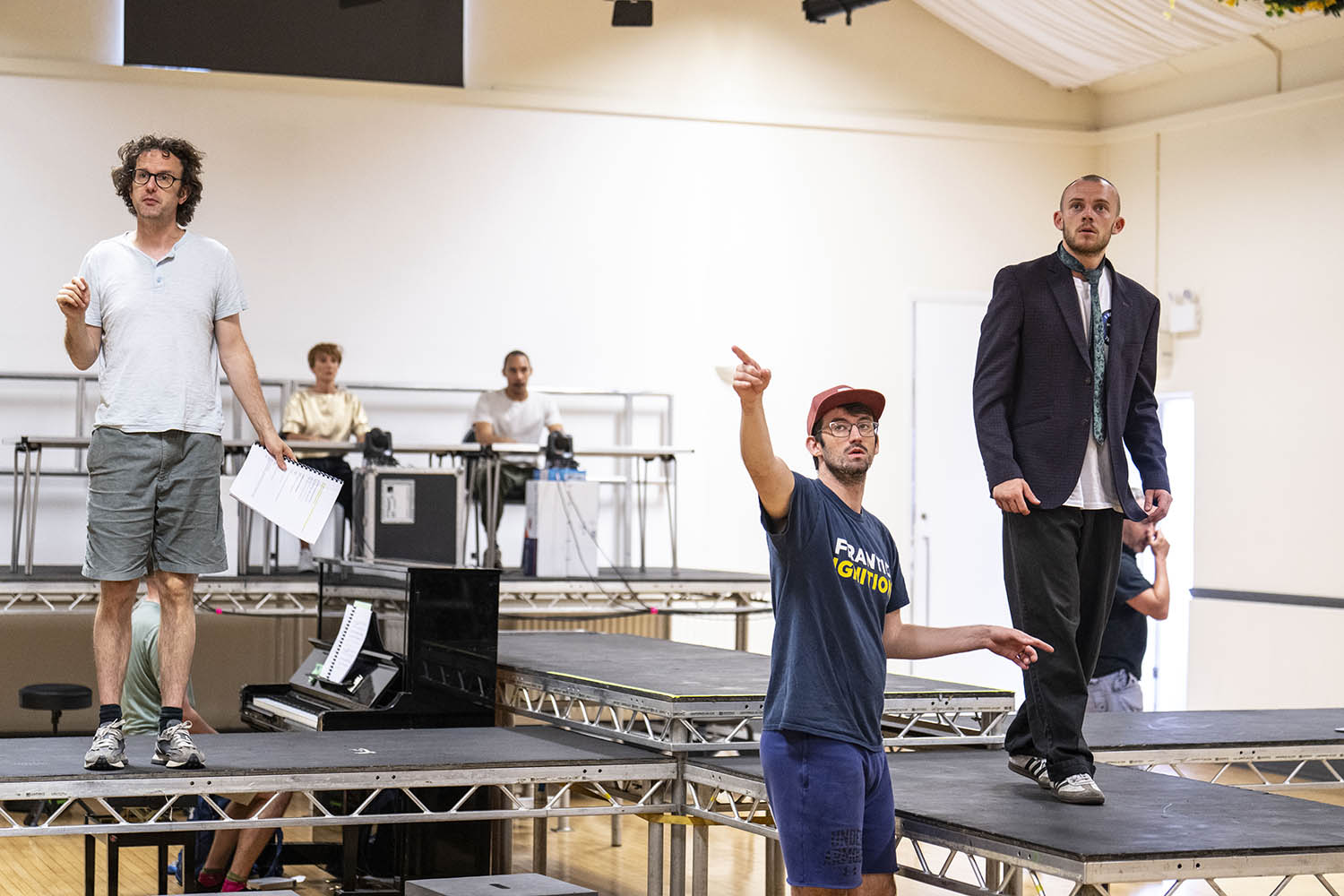
The ensemble members of the Aurora Orchestra rehearse their upcoming production Shostakovich 5
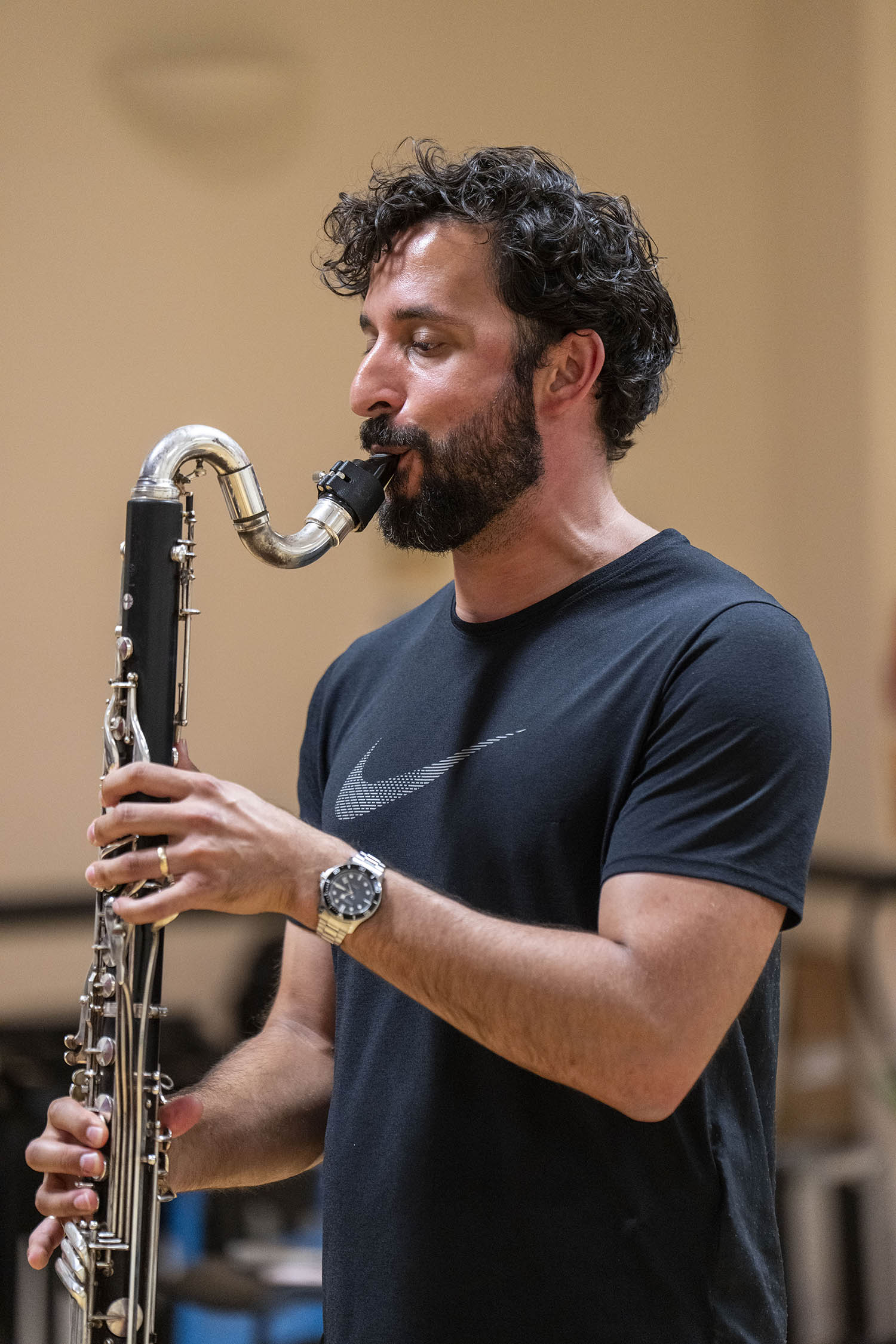
Max Welford on bass clarinet
In telling the story of the composer’s oppression by the Soviet state, Frantic Assembly and Aurora have cast Max Revell – BBC young dancer of the year in 2019 – as a silent Shostakovich, his emotion portrayed by movement alone. Scott Graham, Frantic Assembly’s co-founder and artistic director, describes “the Frantic method” to me. “It presumes we all know nothing, and so we try to seek out a level playing field to start with. Your experience doesn’t matter. Let’s go through a series of steps that ultimately will allow us to achieve something new.”
This is the company’s second collaboration with Aurora, and Graham tells me that until he heard Aurora play Beethoven’s Ninth from memory last year at the Proms, he had never been to a classical concert.
Graham, like me, is a member of Aurora’s target audience: I consider myself a pretty cultured person, yet I’ve often felt shut out of “classical” music, as if it were hard for me to find an entry point. How must it be for those who don’t have my advantages?
“Even as a musician myself,” Mitchell says, “I can understand why, if you’re offered a ticket to the theatre or a ticket to an orchestra, you’d choose the former. I know we have to fight really hard to be heard. But I also think the fight can and should be embraced.”
The company know the fight begins early. The orchestra run a series of immersive storytelling concerts for children aged from nought to five and their families, Far, Far Away; they also work to support music education in primary and secondary schools.
Yet despite the government’s national plan for music education, released in summer 2022, the discipline – like so much of the humanities – is in crisis: only 5,000 students in England took A-level music in 2023, a drop of 45% since 2010. The Independent Society of Musicians identified a 36% drop in GCSE-level pupil numbers; at the same time, secondary school music teacher numbers also fell by more than 1,000 in the same period.
If you ask why we should care, beyond the fact that it is art and the humanities that teach us to be, well, human, I can speak at least anecdotally. I was glad that Theo – the only one of his university cohort to have been state educated – studied music at university because it was his passion; what I discovered was that a music degree is also a history degree, a literature degree, an engineering degree, a maths degree. The option should be available to all.
Collon is committed to Aurora’s outreach, but dismayed that it is necessary. He is also chief conductor of the Finnish Radio Symphony Orchestra – the first non-Finn to hold the post – and describes the very different Scandinavian/European attitude to classical music. “Finland is a country of five million people, but they broadcast every concert our orchestra plays on terrestrial TV: 80,000 people watch every concert. And it’s not always the most accessible music. It’s just built into their DNA. In Europe, every city has an orchestra and an opera house. We have fewer than 10 opera houses in this country; in Germany they have more than 80.”
This discrepancy does not only affect the world of opera: Berlin, with a metropolitan area population of about seven million, had a €947m budget for culture in 2024. The entire cultural budget that year for England – population almost 60 million – was just £458.5m. Collon says that his European colleagues are always surprised at the role British arts companies must play in outreach and education.
The deepest and truest kind of education comes from love. Aurora’s commitment to the works they play and celebrate sings out in every note learned by heart. If you don’t think orchestral music is for you, head to London’s Royal Albert Hall or to the Usher Hall in Edinburgh, and – like me – you may just discover that it’s time to think again.
Aurora Orchestra perform Shostakovich’s Fifth by Heart at the BBC Proms, Royal Albert Hall, London, on Saturday 16 August and Sunday 17 August, and at Edinburgh international festival’s Usher Hall on Monday 18 August
All photographs by Antonio Olmos for the Observer New Review
Newsletters
Choose the newsletters you want to receive
View more
For information about how The Observer protects your data, read our Privacy Policy
